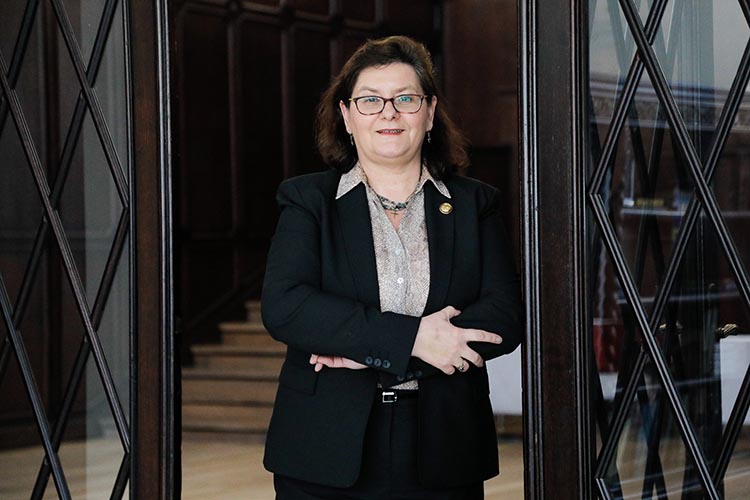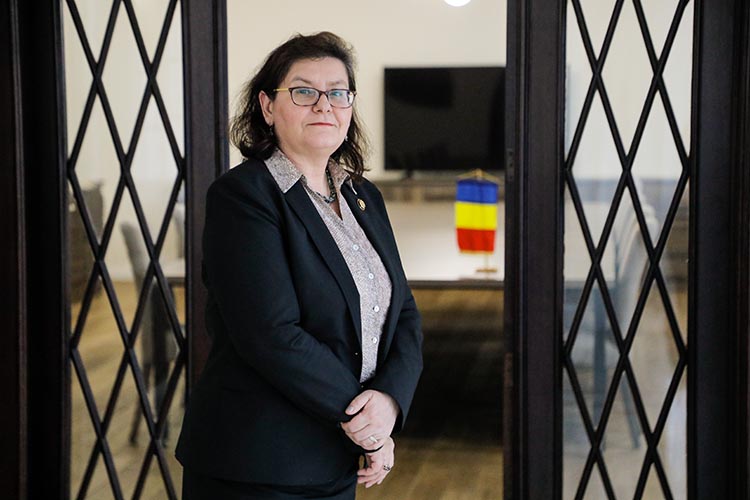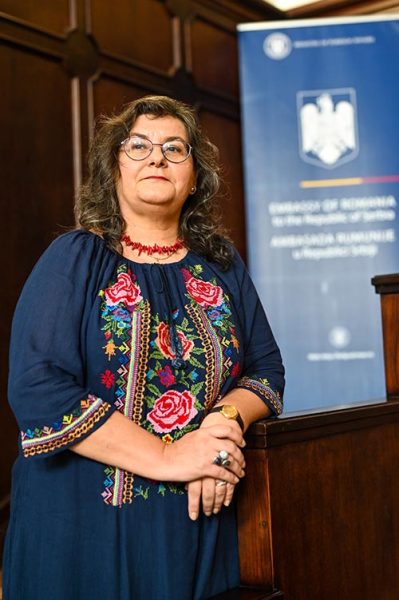Romania has a consistent and principled position on the non-recognition of Kosovo’s unilateral declaration of independence. We maintain a constructive approach on the issue, without prejudice to our national position. It is the primary responsibility of Belgrade and Pristina to reach a comprehensive and definitive solution ~ Silvia Davidoiu
Romanian Ambassador to Serbia Silvia Davidoiu speaks enthusiastically about the strengthening of economic cooperation between the two countries. Speaking in this interview for CorD Magazine, she says that she is looking forward to the next few years. “I expect the fruition of our ambitious, long-planned strategic connectivity projects, and the launching of new partnerships in the agriculture, IT and energy sectors”. And this cooperations is set to be crowned with the construction of a motorway that will reduce travel times between Belgrade and Timișoara to just one hour.
Your Excellency, as the Ambassador of a country that enjoys a high level of understanding and cooperation with Serbia at the political level, you often mention the various possibilities of advancing bilateral economic cooperation. Could you cite progress achieved in this area over the past two years?
– Economic cooperation has substantial potential to further our countries’ growth, having a direct impact on the wellbeing of our citizens and the substance of our bilateral relations. Moreover, it provides a comprehensive vision and additional means to further develop our ties.
One short answer to your question refers to the formal agreements on transport connectivity (e.g., the Timisoara-Belgrade highway/expressway), positive developments in bilateral trade, with a total value surpassing €2.6 billion in 2022, and new initiatives on energy security, aside from the Arad-Mokrin gas interconnector. Over the past two years, we have also diversified our presence on the Serbian market with additional domains (apart from industry) attracting Romanian entrepreneurs. As an example, during this period, Instant Factoring, a Romanian company in the fintech sector, has offered innovative and accessible financing solutions to Serbian SMEs. In April 2023, we also organised a business forum as a preliminary step towards new, regular B2B meetings between Romanian and Serbian companies (operating in the agriculture, energy, construction, industry, ITC and other sectors), aimed at strengthening bilateral economic relations through mutual investments and exchanges. We are committed to implementing all these projects and count on the Serbian side’s engagement in this regard. We are active in some of the economic areas that are most relevant to Serbia’s comprehensive security and sustainable development.

I look forward to the next few years. I expect the fruition of our ambitious, long-planned strategic connectivity projects, as well as the launch of new partnerships in agriculture, IT and energy – all sectors that are expanding in Romania, in Romania, possibly with an external expansion outlook. To give you an example, with my country currently exploring offshore gas reserves, implementing SMR technologies for nuclear power and capitalising the investments of top Romanian players in renewables, I expect my country to consolidate its position as a net energy provider for the region, including Serbia.
How do Romania and Serbia utilise the European Union funds that are provided through the IPA funding mechanism to improve cross-border cooperation?
– Cross-border cooperation between Romania and Serbia, with the support of IPA funds, has a long history of successful partnerships. In the 2014- 2020 programming period alone, 84 projects were contracted, representing 99.98% of the programme budget, with an absorption rate in excess of 95%. This impressive track record encourages us to believe that this IPA instrument will continue to forge new forms of collaboration between our countries.
Cross-border cooperation between Romania and Serbia, with the support of IPA funds, has a long history of successful partnerships. In the 2014-2020 programming period alone, 84 projects were contracted
As for the 2021-2027 period, the Interreg IPA Romania-Serbia Programme counwas the first of its type to be adopted by the European Commission. It focuses on promoting energy efficiency and renewable energy, reducing emissions of greenhouse gases and all forms of pollution, improving equal access to inclusive and quality services in education and health, enhancing the role of culture and sustainable tourism in furthering economic development, and increasing border management capacity. Climate and energy objectives receive 35% of the total allocation of the IPA Interreg Romania-Serbia Programme in the 2021-2027 cycle, as a direct contribution to the European Green Deal and the Green Agenda for the Western Balkans. Moreover, 52% of the Programme’s financial package is dedicated to projects of strategic importance and large infrastructure projects in the fields of healthcare, border management, risk management and emergency situation response.
We are seeing EU accession enthusiasm waning in Serbia, with many believing that this is due to the slowness of the integration process. Serbia has opened only slightly more than half of the accession negotiation chapters, despite the process having started more than a decade ago. It was almost two years ago that the last cluster was opened, which is also when you arrived in Serbia. Does such a tempo contradict the messages coming from the EU about a strong new commitment to the expansion of the bloc to encompass the Western Balkans?
– The EU’s commitment to the European perspective of the Western Balkans is firm and unabated, as reiterated in the European Commission President’s State of the Union Address on 13th September. However, the pace of negotiations depends entirely on candidate countries fulfilling the necessary criteria, particularly on the fundamentals.
EU accession is a two-way street, with regard to the EU’s capacity and willingness to accept new members benchand candidate countries’ consistent and measurable efforts to meet clearly- defined benchmarks. This has been a constant feature, regardless of the revisions of the process conducted over previous years.
On the one hand, the messages from the EU and its Member States clearly testify to the first track of this process being open and unobstructed for those Western Balkan and Eastern European countries that fulfil the accession criteria. That represents encouragement for these partners to internalise European values and principles in their entirety. Three more counwas tries were granted EU candidate status over the past year, including one from this region. The process is therefore advancing and the messages do match the actions.

On the other hand, the second track of European integration relates to their merit-based quality and it is thus the sole responsibility of candidates and potential candidates to determine the pace of reform. This implies that, by the time of accession, these countries should be strategically aligned with the EU and fully harmonised with the acquis, including when it comes to respect for fundamental rights and compliance with the EU’s Common Foreign and Security Policy. This is a key aspect that ensures the sustainability of political and economic partnerships with candidate and potential candidate countries, creating the conditions for a strengthened EU.
The statement of the President of the European Council regarding some countries of our region being possibly admitted into the EU in 2030 garnered a lot of negative comments in Brussels. Can we continue to take the enlargement process seriously without specific dates for the next round of enlargement?
– Charles Michel’s recent reference to the bloc’s readiness to accept new members is firstly a confirmation that enlargement remains a top priority for the EU over the coming years. It is also encouragement for candidates to increase the tempo of key reforms in order to secure solid and irreversible achievements that are in line with each partner’s relationship with the EU, in a dynamic and merit-based approach. It therefore represents an appeal for active and consistent engagement on all sides for the new enlargement of the EU. The President of the European Council was explicit in his speech in Bled about the imperative of ensuring the process remains credible. This is dependent on the EU’s openness to continue the enlargement process, but also on candidates’ fulfilment of necessary benchand marks. Again, the twin-track approach of advancing on the basis of merit remains in place, so there is consistency in messaging, just as we are on the same page in our understanding that Western Balkan (and Eastern European) states belong within the Union. Whether we manage to meet this mutual goal within a specific timeframe depends on all of us. We all need to take the process seriously in order to make EU integration happen and to keep it within the lines of a successful policy for the transformative effect on candidates and potential candidates and the bloc’s internal coherence and external appeal and action.
The messages from the EU and its Member States clearly testify to the first track of this process being open and unobstructed for those Western Balkan and Eastern European countries that fulfil the accession criteria
There are frequent calls coming from within the EU that encourage Serbia to change its stance on Kosovo, but also the EU Member States that have chosen not to recognise the unilaterally declared independence of Kosovo. Will Romania maintain its stance on this issue? — First, allow me to offer a few clarifications: we have not experienced any calls or pressure to change our stance regarding the status of Kosovo. The interactions we have had with third parties on this topic were more in line with evaluating our position in the context of our common renewed interest in firmly advancing the dialogue and reconciliation between Belgrade and Pristina. This is an approach that we welcome and encourage in an effort to dispel any misunderstanding.
Romania has a consistent and principled position on the non-recognition of Kosovo’s unilateral declaration of independence. We maintain a constructive approach on the issue, without prejudice to our national position. It is the primary responsibility of Belgrade and Pristina to reach a comprehensive and definitive solution. My country joined the efforts of the EU and other relevant actors in supporting the normalisation process through result-oriented negotiations between the two parties.
Romania reasserts its full support for the EU-mediated Political Dialogue, which represents the only adequate framework to normalise relations between Belgrade and Pristina. Against the backdrop of persistent tension, the two sides need to reengage in this framework to identify a solution that reflects their respective interests and contributes to the peace and stability of the region, with full respect for all agreements reached to date in the EU-facilitated dialogue process.
Are you satisfied with the status and treatment of members of the ethnic Romanian community in Serbia?
– Our respective national minorities have anchored our relations in a state of mutual respect and good neighbourliness, despite the changes experienced by our countries in recent history. They are also a source of constant enrichment for our historic ties and provide a reference point to the quality of the overall Romanian- Serbian dialogue. We cherish this outstanding bond and remain constructive, open and transparent in our support for the rights of those belonging to our ethnic minorities.

Romania’s constant interest in the preservation of the cultural ethos of its national minority, its mother tongue and religious identity, is consistent with European standards in this field, which are crucial for a democratic society.
Serbs in Romania enjoy all the rights stipulated by the relevant international documents: parliamentary representation, education, religious services and media in their native language. They are active in local administrations and provide an important contribution to our society. We would like to see all citizens that identify as Romanian in Serbia fully enjoying the rights provided by the national legislation and international documents signed by the state, and provided by requirements on the EU accession path.
Differences nonetheless persist, with Romanians in Eastern Serbia having restricted access to education, media and religious services in their mother tongue, as well as limited representation in local and national administration, in contrast to those residing in Vojvodina. These issues should be substantively tackled within the framework of the Romanian- Serbian Joint Intergovernmental Commission for National Minorities, the third protocol of which is currently being negotiated.
| DIALOGUE Romania reasserts its full support for the EUmediated Political Dialogue, which represents the only adequate framework to normalise relations between Belgrade and Pristina | ENERGY I expect my country to consolidate its position as a net energy provider for the region, including Serbia | EU Charles Michel’s recent reference to the bloc’s readiness to accept new members is firstly a confirmation that enlargement remains a top priority for the EU over the coming years |
|---|